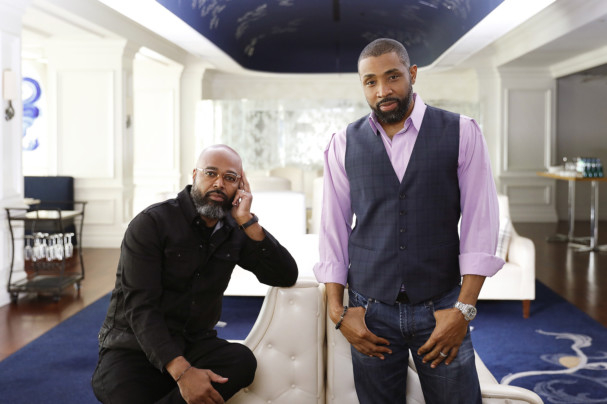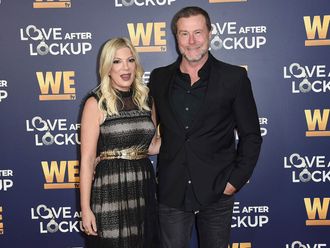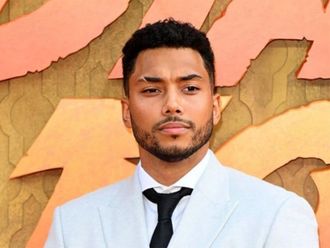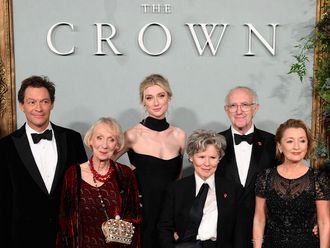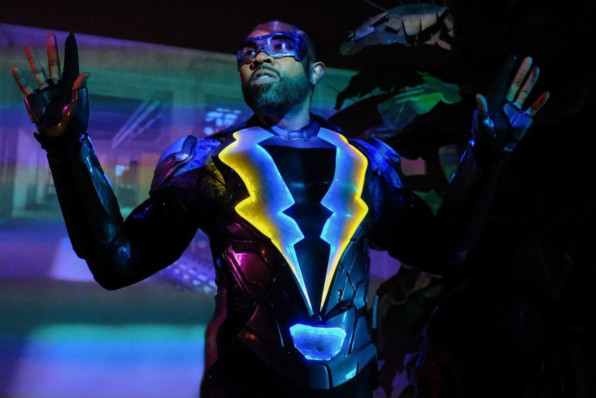
The new year isn’t even a month old, and a new superhero is charging onto the scene, smashing into the jam-packed universe already occupied by Superman, Batman, Thor, Wonder Woman and a seemingly endless parade of costumed crime fighters.
But the producers of Black Lightning, the new CW series based on the DC Comics character launching Tuesday, have a broader agenda than creating another fantastic world where good battles evil.
The drama, which joins the network’s superhero slate — Arrow, Supergirl, The Flash and DC’s Legends of Tomorrow — aims to deliver a shock wave, injecting topical issues and a sharp cultural perspective focused on the concerns facing African Americans.
“We want to have an authentic black voice and a show that deals with what I grew up with and what I know,” said executive producer and showrunner Salim Akil.
“This is personal to me,” said Akil, who wrote the pilot with his wife and fellow executive producer, Mara Brock Akil (Girlfriends, The Game). “I wanted to add something not only to black culture but to American culture that can’t be taken away.”
Cress Williams (Hart of Dixie, Living Single) plays the titular hero, Jefferson Pierce, a scrupulous high school principal and divorced father of two daughters living in the fictional city of Freeland.
Nine years before the start of the series — after a near-fatal showdown with his nemesis Tobias Whale (Marvin Jones III) — Pierce retired his alter ego Black Lightning, a masked vigilante with the power to manipulate electricity.
But superheroes rarely stay retired. Pierce resurrects Black Lightning to combat racist cops and a violent gang, led by Whale, terrorising the community. The battle becomes personal when gang members target his daughters, activist Anissa (Nafessa Williams) and high-schooler Jennifer (China Anne McClain), who turn out to have special skills of their own. (Stay tuned for “Thunder” and “Lightning.”)
One of the key goals for Akil, who grew up in Richmond, California, is to show that black heroes matter.
“In my community, I know who the good guys and the bad guys are,” he said. “I’ve never seen Superman go to Chicago. I’ve never seen Batman go to Watts. There are no superheroes going into the neighbourhoods I grew up in and fighting any kind of crime. So that was a must in terms of the world ‘Black Lightning’ would live in. There are no more heroic people than those who live with the threat of gun violence and drugs. It’s not even about what race you are. It’s about socioeconomic status.”
Williams, in a joint interview with Akil, said he was overcome with emotion when he watched the pilot.
“This is a legacy project, not only for me as an actor but as an artist,” said the big- and small-screen veteran who has appeared on everything from Beverly Hills, 90210 to Friday Night Lights. “This is a show I can hang my hat on. I’ve never wanted my art to be just about entertainment. I want it to touch, illuminate and inspire things.”
Although Black Lightning features many familiar comic book touchstones — the reluctant hero, the snazzy suit, the complicated romantic life — they are filtered through a contemporary prism crafted by a predominantly black writing staff.
Characters quote Martin Luther King Jr. and civil rights activist Fannie Lou Hamer (“I’m sick and tired of being sick and tired.”) The soundtrack ranges from contemporary hip-hop to vintage R&B tunes like Isaac Hayes’ version of the pop classic Walk on By and Billy Paul’s socially conscious Am I Black Enough for You?
While the series hails from executive producer Greg Berlanti, the man behind the other D.C. shows on the CW, don’t look for any crossover episodes. Black Lightning is designed to stand on its own.
“I saw the script, and it was different in so many ways but also fit the genre,” said CW President Mark Pedowitz. “It’s a DC character and property. It fits the lineup, but we made a decision that it doesn’t fit in the ‘Arrowverse’ because it has a unique perspective. Black Lightning is a more mature superhero. The show depicts an African American family trying to exist and survive in this world. It’s about realising that vision, not making [it like] everything else.”
“I’d rather be here than that clubhouse,” agrees Williams of staying out of the “Arrowverse.” “We offer the audience for those shows the things they like to see, and more. It might add another dimension to their palette.”
The drama marks a triumphant return to the CW for the Akils. The couple departed in 2009 when the network axed The Game, the sports-world comedy created by Brock Akil. BET picked up the show, which not only became a hit but helped launch that network into the scripted series space. (Brock Akil also created BET’s first hour-long drama, Being Mary Jane, starring Gabrielle Union.)
Black Lightning also plunges into a genre formerly dominated by white crime fighters, that is now seeing an increasing number of costumed superheroes of colour, including Netflix’s Luke Cage and the Justice League’s Aquaman. Marvel’s Black Panther is already a hot property weeks before its February 16 premiere.
Akil said he has no concerns about competition from other black superheroes. “Black Lightning is not Black Panther. They’re not telling our story. Luke Cage is not telling our story. All these stories are different, and they can all exist,” he said. “It shows that we can be just as diverse as white people.”
A smiling Williams added, “Nobody ever asks if there are too many white superheroes.”
While Akil is crossing his fingers that Black Lightning strikes a chord with viewers, he has an even bigger hope.
“If I see one kid dressing up as Black Lightning or Thunder or Lightning at Halloween,” he said, “That would be it for me. I’m good.”



